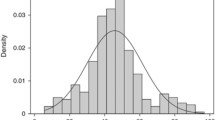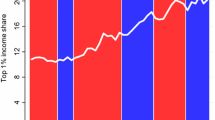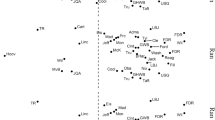Abstract
For the United States, the issue of the impact of aggregate economic conditions on legislative election returns has received extensive research. For European countries, however, research is much less plentiful. In particular, multiparty systems such as France and Italy lack study. For both these nations, we find that worsening aggregate economic conditions significantly increase the legislative vote for leftist parties, which have traditionally played an opposition role. Further, these models seem strong enough to provide good prediction of the actual legislative vote share. For example, they manage to forecast the 1981 victory of the left in France, and the 1980 Communist party support in Italy.
Similar content being viewed by others
References
Arcelus, Francisco, and Allan H. Meltzer (1975). “The Effect of Economic Variable on Congressional Elections.”American Political Science Review 69(December 1975):1232–1239.
Bloom, Howard S., and H. Douglas Price (1975). “Voter Response to Short-Run Economic Conditions: The Asymmetric Effect of Prosperity and Recession.”American Political Science Review 69(December 1975):1240–1254.
Fiorina, Morris P. (1978). “Economic Retrospective Voting in American National Elections: a micro-analysis.”American Journal of Political Science 22(May 1978):426–443.
Galli, Giorgio (Ed.) (1968).Il Comportamento Elettorale in Italia. Bologna: Societa Editrice il Mulino.
Galli, Giorgio, and Alfonso Prandi (1970).Patterns of Political Participation in Italy. New Haven, Conn.:Yale University Press.
Goodman, Saul, and Gerald H. Kramer (1975). “Comment on Arcelus and Meltzer, The Effect of Aggregate Economic Conditions on Congressional Elections.”American Political Science Review 69(December 1975): 1255–1265.
Kinder, Donald R., and D. Roderick Kiewiet (1979). “Economic Discontent and Political Behavior: The Role of Personal Grievance and Collective Economic Judgments in Congressional Voting.”American Journal of Political Science 23(August 1979):495–527.
Kramer, Gerald H. (1971). “Short-Term Fluctuations in U.S. Voting Behavior, 1896–1964.”American Political Science Review 65(March 1971):131–143.
Lafay, Jean-Dominique (1977). “Les Consequences Electorales de la Conjoncture Economique: Essais de Prevision Chiffree pour Mars 1978.”Vie et Sciences Economiques No. 75(October 1977):1–7.
Lange, Peter (1979) I1 PCI e i possibili esiti della crisi Italiana. In Luigi Graziano and Sidney Tarrow (Eds.),La Crisi Italiana. Torina: Giulio Einaudi Editore.
Lepper, Susan (1974). “Voting Behavior and Aggregate Policy Targets.”Public Choice, 18(September 1974):67–82.
Lewis-Beck, Michael S. (1980). “Economic Conditions and Executive Popularity: The French Experience.”American Journal of Political Science, 24(May 1980):306–323.
Lieber, Nancy I. (1975). “Politics of the French Left: A Review Essay.”American Political Science Review, 69(December 1975):1406–1419.
Machin, Howard, and Vincent Wright (1977). “The French Left Under the Fifth Republic: The Search for Identity in Unity.”Comparative Politics, 10(October 1977):35–67.
McCracken, Paul W. (1973). “The Practice of Political Economy.”American Economic Review, 63(May 1973):168–171.
Okun, Arthur M. (1973). “Comments on Stigler's Paper.”American Economic Review, 63(May 1973):172–177.
Pasquino, Gianfranco (1977). “The Italian Socialist Party: An Irreversible Decline?” In Howard Penniman (Ed.),Italy at the Polls. Washington, D.C.: American Enterprise Institute for Public Policy Research.
Rosa, Jean-Jacques, and Daniel Amson (1976). “Conditions Economiques et Elections: Une Analyse Politico-Econometrique (1920–1973).”Revue Francaise De Science Politique, 26(December 1976):1101–1124.
Sani, Giacomo (1978). “La Composizione Degli Elettorati Comunista e Democristiano.” In Alberto-Martinelli and Gianfranco Pasquino (Eds.),La Politica Nell' Italia Che Cambia. Milano: Feltrinelli.
Stigler, George J. (1973). “General Economic Conditions and National Elections.”American Economic Review, 63(May 1973): 160–167.
Tufte, Edward R. (1974).Data Analysis for Politics and Policy. Englewood Cliffs, N.J.: Prentice-Hall.
Tufte, Edward R. (1975). “Determinants of the Outcomes of Midterm Congressional Elections.”American Political Science Review, 69(September 1975):812–826.
Whiteley, Paul (Ed.) (1980).Models of Political Economy. London and Beverly Hills, Calif.:Sage.
Author information
Authors and Affiliations
Rights and permissions
About this article
Cite this article
Lewis-Beck, M.S., Bellucci, P. Economic influences on legislative elections in multiparty systems: France and Italy. Polit Behav 4, 93–107 (1982). https://doi.org/10.1007/BF00987121
Issue Date:
DOI: https://doi.org/10.1007/BF00987121




